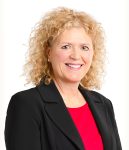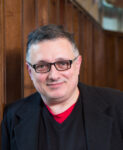Program Format
Full-time In-Person
Students normally complete the program in four years.
Combining access to renowned nursing researchers and mentors, the PhD program includes two years of course work and at least two years of work on the thesis/research project. In addition to required courses, students also attend a three-day research symposium where they connect with their peers and supervisor.
Program Overview
Why Choose Bloomberg Nursing at U of T?
Bloomberg Nursing was one of the first post-secondary institutions in Canada to offer a graduate education in nursing. Our commitment to excellence continues with the brightest minds in nursing research, scholarship, clinical practice and health care administration. As a graduate of Bloomberg Nursing, you are not only prepared to succeed, you join a community of scholars advancing health care through innovative research and evidence-based knowledge translation that influences policy and practice nationally and internationally.
Full-Time Program
PhD students must enrol on a full-time basis. PhD students normally complete the degree in four years of full-time study. All requirements for the degree must be completed within six calendar years from the date of the student’s enrolment in the program.
The required course components of the PhD program are offered in-class only.
Program Requirements
The PhD in Nursing is offered as a full-time program.
Courses
Successful completion of all required courses by the end of Year 2 in the program.
Students must successfully complete a minimum of 3.0 full course equivalents (FCEs) that include:
-
PhD Seminar (1.0 FCE)
-
Research methods course NUR 1079Y Research Methods for Knowledge Discovery (1.0 FCE)
-
One course (0.5 FCE) related to the substantive area of the field of study and thesis plans
-
One course (0.5 FCE) may be either a method or substantive area course as determined by the student and the supervisory committee.
Students must attain a minimum average standing at the B+ level for required courses.
Students are normally expected to complete all five required courses (3.0 FCEs) by the end of Year 2. If all required courses are not successfully completed (with a minimum average standing at the B+ level) by the end of Year 3, the Faculty of Nursing will normally make a recommendation to SGS for termination of registration.
For students who enrolled prior to September 2020:
Students must successfully complete a minimum of 3.0 Full Course Equivalents (FCEs) that include:
-
PhD Seminar (1.0 FCE)
-
Field of study Course (0.5 FCE) that includes one of the following:
- NUR 1085H (for students in the critical perspectives in health and healthcare field of study)
- NUR 1086H (for students in the Nursing Health Systems field of study) or
- NUR 1087H (for students in the Effective Care and Health Outcomes field of study)
-
At least one method course (0.5 FCE) relevant to the field of study and to the dissertation plans
-
At least one course (0.5 FCE) related to the substantive area of the field of study and thesis plans
-
The fifth required course (0.5 FCE) may be either a method or substantive area course as determined by the student and the supervisory committee.
All PhD students should visit the SGS site on PhD supervision. It has important information on the topic of student-supervisor relationship: SGS PhD Supervision
Literature Review Paper
Successful completion of the literature review paper.
The literature review paper topic as well as type and format of the literature review paper must be approved by the supervisor (with signed documentation by the student and supervisor) by March 1 of Year 1. This agreement should specify the problem statement, the format/type of literature review that is appropriate to the field of study, and to the scholarly traditions within which the student’s research is situated.
The literature review paper must be submitted by September 30 of Year 2. The submitted literature review paper will be formally reviewed and evaluated by the supervisor and at least one additional thesis committee member. Written and verbal feedback about the submitted literature review paper will be provided to the student at a supervisory committee meeting. For the literature review paper to be considered a pass, both faculty members’ assessments of the literature review paper must be at the successful completion or pass level. If both examinations are considered pass, the student may receive either a satisfactory or excellent rating at their supervisory committee meeting. If one or both paper reviews are rated unsatisfactory or not pass, then the student receives an unsatisfactory rating at the supervisory committee meeting.
If the student does not successfully complete the literature review paper first submitted, the student will have one additional opportunity to revise and rewrite the literature review paper, based on the feedback received at the supervisory committee. The student must resubmit the revised literature review paper by December 1 of Year 2. This revised literature review paper must be formally evaluated by the supervisor and one other thesis committee member (normally the same committee member who completed the assessment of the original literature review paper). The student will receive feedback about the revised literature review paper at a supervisory committee meeting. For the literature review to be considered a pass, both faculty members’ assessments of the literature review must be at the pass level. If both reviews are considered pass, the student may receive either a satisfactory or excellent rating at their supervisory committee meeting. If one or both reviews are rated failure/not pass, then the student receives an unsatisfactory rating at the supervisory committee meeting.
If the student does not successfully complete the literature review paper on the second attempt, the Faculty of Nursing will normally recommend to SGS that the student’s registration in the PhD program be terminated.
Thesis Proposal
Successful defense of the thesis proposal, normally by the end of Year 2.
Students are normally expected to defend their thesis proposal by the end of Year 2 of their program. Students must successfully defend their thesis proposal no later than the end of Year 3. The format of the proposal will be similar to that of a modified tri-council grant application. Assessment of the thesis proposal consists of both the written proposal and the oral defence of the proposal. Students who do not successfully defend the proposal after the first attempt may have one additional opportunity to successfully present and defend the written proposal, and this must be accomplished before the end of Year 3 of the program.
If the student does not successfully defend the thesis proposal by the end of Year 3 (including a second attempt, if required), the Faculty of Nursing will recommend to SGS that the student’s registration in the PhD program be terminated.
The student’s dissertation will be defended in the PhD Final Oral Examination of the School of Graduate Studies.
Program Length: 4 years full-time; 5 years transfer-from-master’s
Time Limit: 6 years full-time; 7 years transfer-from-master’s
Admission Requirements
Applicants are admitted under the general regulations of the School of Graduate Studies. Applicants must also satisfy the Graduate Department of Nursing Science’s additional admission requirements stated below:
-
Applicants must hold a master’s degree or its equivalent in nursing or related field with at least a B+ standing from a recognized university.
-
All English facility requirements must be met at the time of application.
-
Applicants whose primary language is not English and who graduated from a university where the language of instruction and examination was not English must demonstrate proficiency in English. An interview may be required.
Please email connect.nursing@utoronto.ca for information on the PhD program and the application process including identifying a supervisor. Please note that meeting minimum admission requirements does not ensure admission to the program.
Transfer from the MN Program into the PhD Program
Exceptional students who are excellent candidates for the PhD program may apply to transfer from the MN to the PhD program. Students must currently be enrolled in the MN program at the Bloomberg Faculty of Nursing, University of Toronto to qualify.
Candidates applying to transfer from the MN program must have:
1. Agreement of an identified supervisor.
2. Completed the following:
MN-Clinical: Four courses; two completed with a minimum grade of B+ and the following two required courses, both with a minimum grade of A:
MN-HSLA: Four courses; two completed with a minimum grade of B+ and the following two required courses, both with a minimum grade of A:
MN-NP: Four courses; two completed with a minimum grade of B+ and the following two required courses, both with a minimum grade of A:
Courses
See yourself in our program
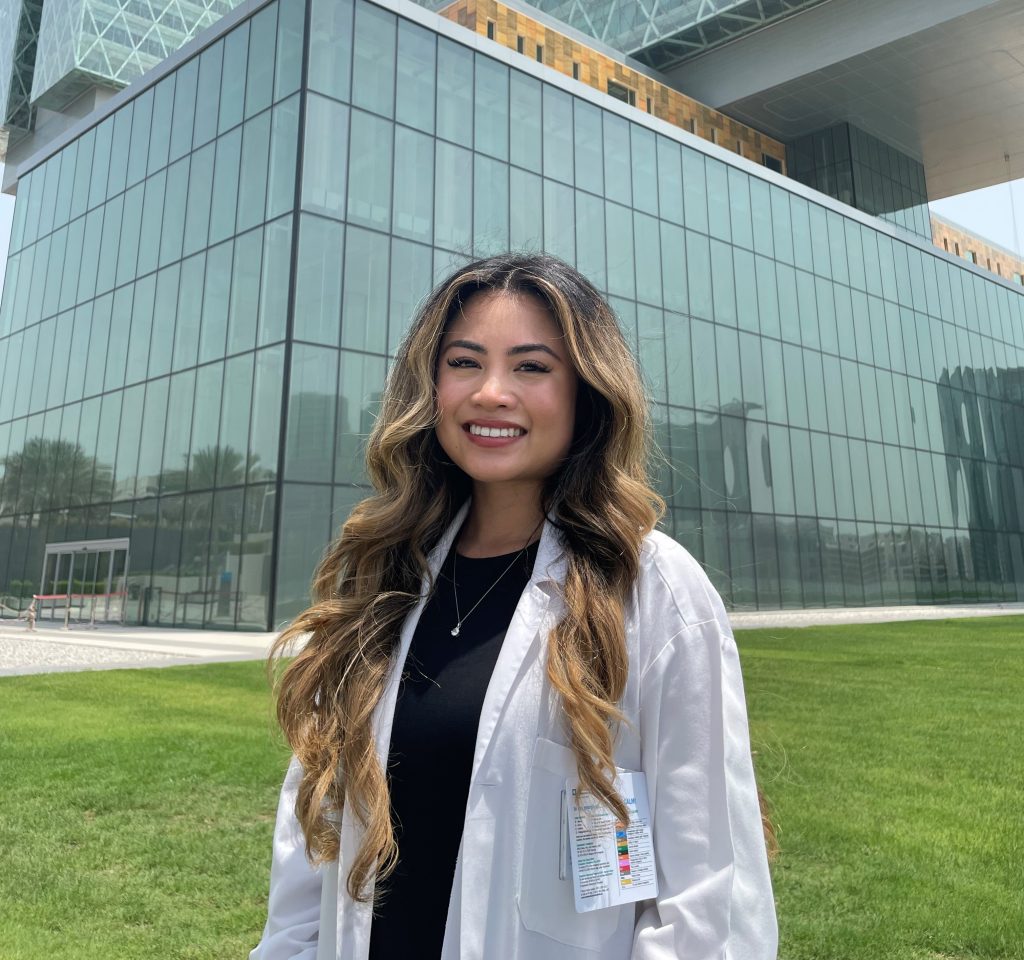
Anjelica Martinez
Summer nursing internship in Abu Dhabi provides unique opportunity to explore international nursing experience
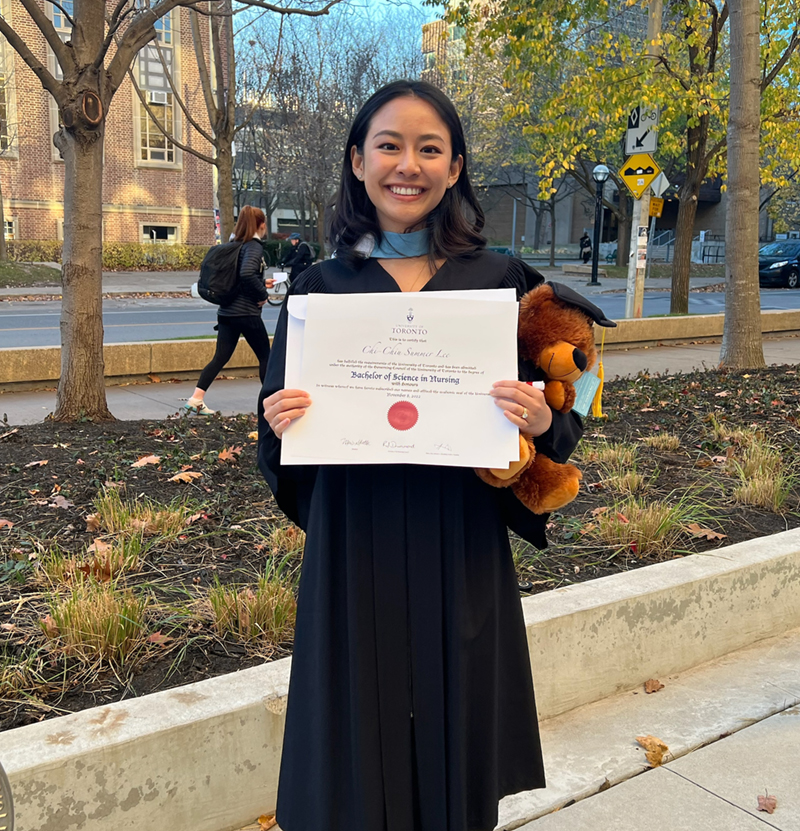
Summer Lee
“We are all in this together” – Nursing grad aims to advocate for future nurses

Jinal Patel
A chance to make a difference – New nursing students share inspiration for joining nursing profession
Latest Testimonials
I was impressed by the dedication and expertise of the faculty members. Their commitment to fostering a dynamic learning environment, combined with their wealth of real-world experience, truly set the […]
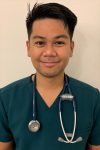
The first year was hard and busy but transformational. The curriculum provided students with various ways of learning including lectures, online discussions, case studies, and simulation labs. Learning hands-on from […]

Being a Doctor of Nursing student has led me on a journey of intellectual growth and discovery and through rigorous research, collaboration with esteemed peers from across Canada, and mentorship […]

Introduced at a time when learning health systems are unfolding across Canada, Bloomberg’s Doctor of Nursing program has commenced at a perfect time. During this program, I have gained a […]
I chose to attend Bloomberg Nursing at the University of Toronto for graduate studies to engage deeply with leading nurse scholars and learn within a community of emerging nurse leaders, […]

As a student, my most memorable learning experience took place in a second-year class on reflexive nursing practice. Prior to taking this class, I was unaware of reflexive practice and […]

Meet the team
Bloomberg Nursing prides itself on providing our students with expert faculty in the field of nursing innovation and science. You will learn directly from nurses and nurse practitioners with a variety of clinical backgrounds.
Related Programs
Undergraduate
Bachelor of Science in Nursing
Our accelerated, two-year Bachelor of Science in Nursing program opens the door to a long and rewarding career in health care.
Graduate
Master of Nursing
Our Master of Nursing program prepares nurses to be professional leaders in their chosen advanced practice field.
Graduate
Post-Master Nurse Practitioner Diploma
A program designed for nurses who have completed a Master’s degree, preparing them for NP roles.
Graduate
Collaborative Specializations for Master’s and Doctoral Students
Providing a multidisciplinary experience that enhances student expertise in their chosen graduate degree.
Graduate
Doctor of Nursing
Thesis-based program. Students learn to identify and investigate a challenge in healthcare or nursing education and design implementation and evidence-based strategies to improve outcomes.









